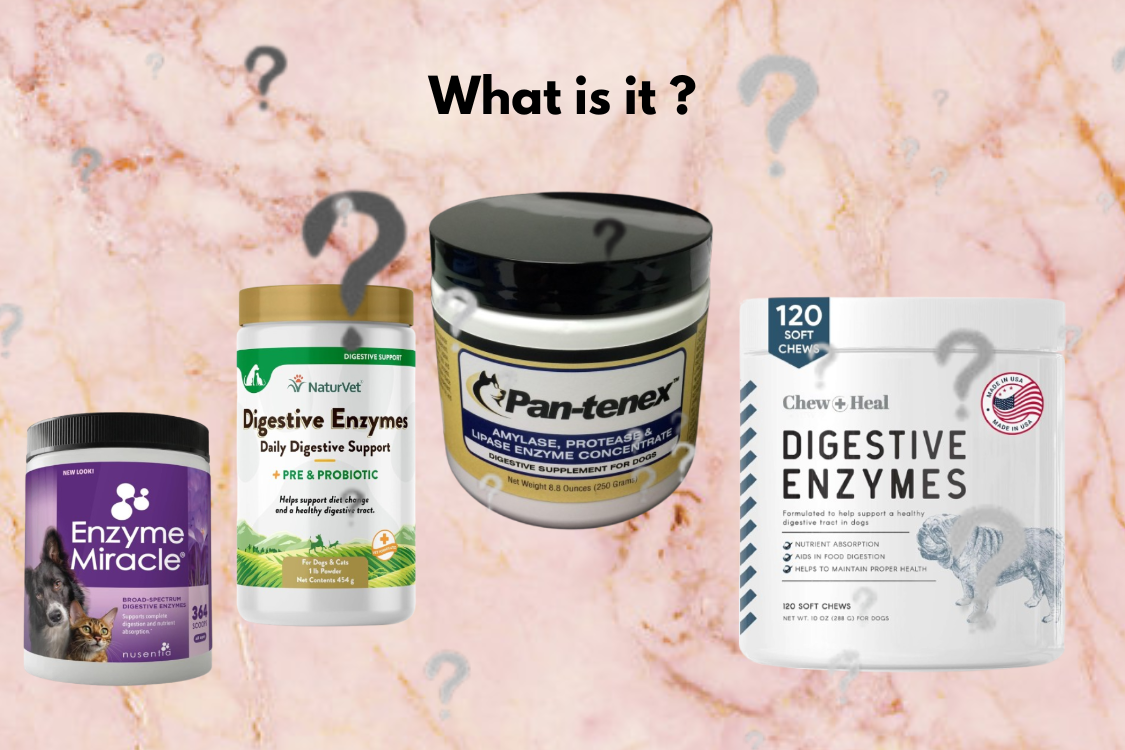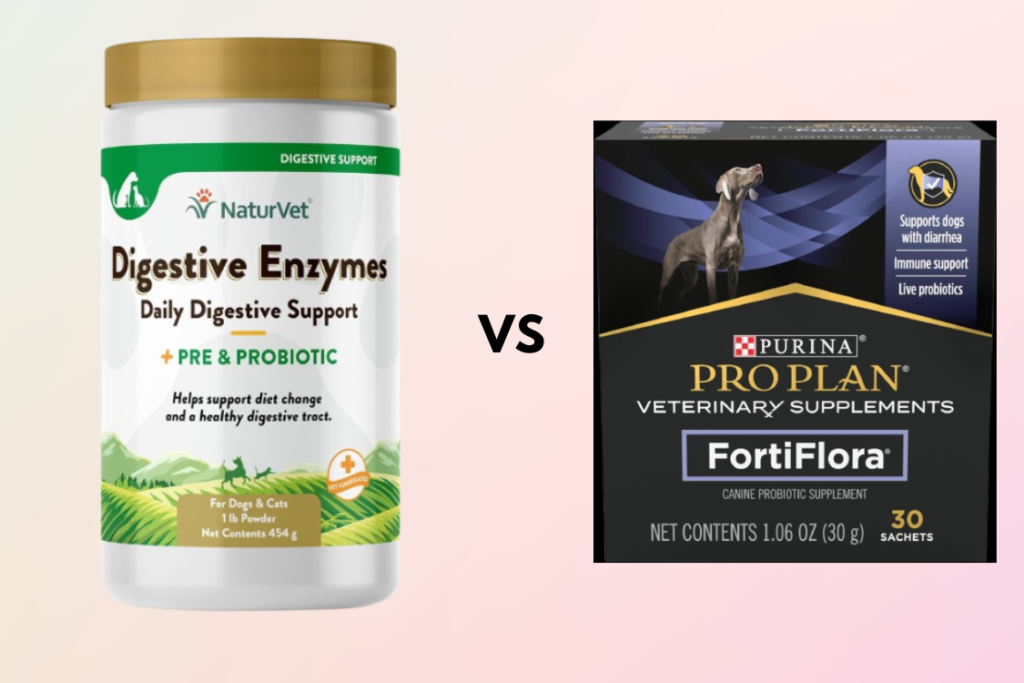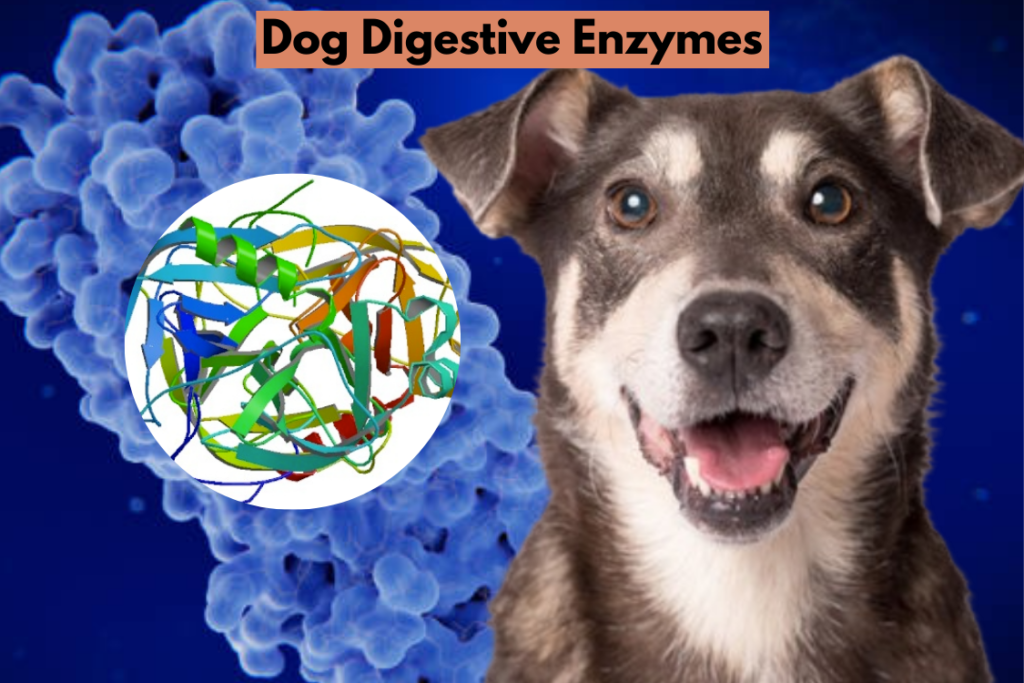If your dog suffers from tummy troubles, chronic gas, or inconsistent stools, they might be missing one vital component: digestive enzymes. These natural helpers play a critical role in how your dog processes food—and when they’re lacking, it can lead to digestive discomfort and nutrient deficiencies.
In this article, we’ll break down what digestive enzymes are, why they matter, how to recognize the signs of enzyme deficiencies, and when supplementing might be the right move for your pup’s health.
What Are Digestive Enzymes in Dogs?

Digestive enzymes are proteins that help break down food into smaller, absorbable components. Your dog’s pancreas naturally produces these enzymes, and they also come from raw foods. But for many dogs—especially older ones or those with sensitive stomachs—natural enzyme production may not be enough.
There are four primary types of enzymes that aid in digestion:
- Protease – Breaks down proteins
- Lipase – Breaks down fats
- Amylase – Breaks down carbohydrates
- Cellulase – Assists with fiber digestion (though not produced by dogs naturally)
When your dog lacks these enzymes, their digestive system struggles to process food, leading to a host of uncomfortable symptoms.
Signs Your Dog May Need Digestive Enzymes

When gas, bloating, and diarrhea aren’t just occasional.
It’s normal for dogs to have digestive upset every now and then. But when issues become frequent, it could indicate enzyme deficiency. Here are common signs your dog may benefit from digestive enzymes:
- Frequent farting or bloating
- Diarrhea or soft stools
- Undigested food in stool
- Weight loss despite a healthy appetite
- Frequent vomiting
- Skin and coat issues (due to poor nutrient absorption)
- Low energy or sluggishness after meals
If any of these symptoms are persistent, it’s worth talking to your vet. Enzyme deficiency isn’t just uncomfortable—it can prevent your pup from getting the nutrients they need to thrive.
What Causes Digestive Enzyme Deficiency in Dogs?

There are a few key reasons why your dog might not be producing enough digestive enzymes:
- Age – Senior dogs naturally produce fewer enzymes
- Pancreatic conditions, such as Exocrine Pancreatic Insufficiency (EPI) and pancreatic cancer
- Highly processed diets that lack natural enzymes
- Breed predispositions (e.g., German Shepherds are more prone to EPI)
- Antibiotic overuse, which can harm gut flora
A lack of enzymes doesn’t always mean something is seriously wrong, but it does mean your dog could benefit from support.
The Benefits of Digestive Enzyme Supplements

Supplementing your dog’s diet with digestive enzymes can offer a wide range of benefits:
- Improved digestion – Less bloating, gas, and tummy trouble
- Better nutrient absorption – More energy, stronger immune system
- Healthier skin and coat – Due to better uptake of fatty acids
- Weight stabilization – Especially helpful for dogs struggling to gain or maintain weight
- Reduced stool volume – A sign of improved digestion efficiency
These supplements typically come in powder or chewable form and are easy to mix with your dog’s food.
If your dog experiences frequent digestive issues or other health concerns, pet insurance can provide financial protection against unexpected vet bills. You should always compare pet insurances to find the best coverage for conditions like digestive problems, ensuring that your pup gets the care they need without breaking the bank.
How to Choose the Right Digestive Enzyme Supplement

When shopping for a digestive enzyme for your pup, keep these tips in mind:
- Look for a broad-spectrum formula with protease, lipase, amylase, and cellulase
- Choose a product specifically formulated for dogs (not human enzymes)
- Avoid artificial additives or fillers
- Consider combination products that include probiotics for added gut support
- Check for third-party testing or vet recommendations
Popular picks among dog owners include Pan-tenex 10x Digestive Enzymes, NaturVet Digestive Enzymes and
Chew + Help Digestive Enzymes with Probiotics all offering targeted support for gut health.
Want a deeper comparison? Go check out Top 4 Digestive Enzyme Supplements for Dogs.
Digestive Enzymes vs. Probiotics: What’s the Difference?

Both matter—but they’re not the same
It’s easy to confuse digestive enzymes with probiotics, since both support digestion. However, they serve different roles:
- Digestive enzymes help break down food during digestion
- Probiotics are beneficial bacteria that live in the gut and support overall GI health
Think of enzymes as the tools that break down food, and probiotics as the clean-up crew that helps maintain a balanced gut environment. For many dogs, a combination of both provides optimal results.
When to Talk to Your Vet

While enzyme supplements are available over the counter, it’s best to consult your veterinarian before introducing one—especially if your dog has pre-existing conditions. In some cases, digestive issues may stem from more serious problems like food allergies, IBD, or even parasites.
A vet may recommend diagnostic testing and help determine whether digestive enzymes, dietary changes, or medication are the best course of action.
Support Your Dog’s Gut, Support Their Life

Your dog’s digestive health plays a critical role in their overall well-being. If your pup is struggling with chronic stomach issues, low energy, or inconsistent stools, digestive enzymes could be the missing link to a healthier, happier life.
As always, work with your veterinarian to choose the right supplement and monitor your dog’s progress. And if you’re a new puppy parent feeling a bit lost, consider checking out an online dog training programs—with guidance on puppy diets and gut health as part of their support.
A happy gut means a happy pup. Start supporting your dog’s digestion today!



